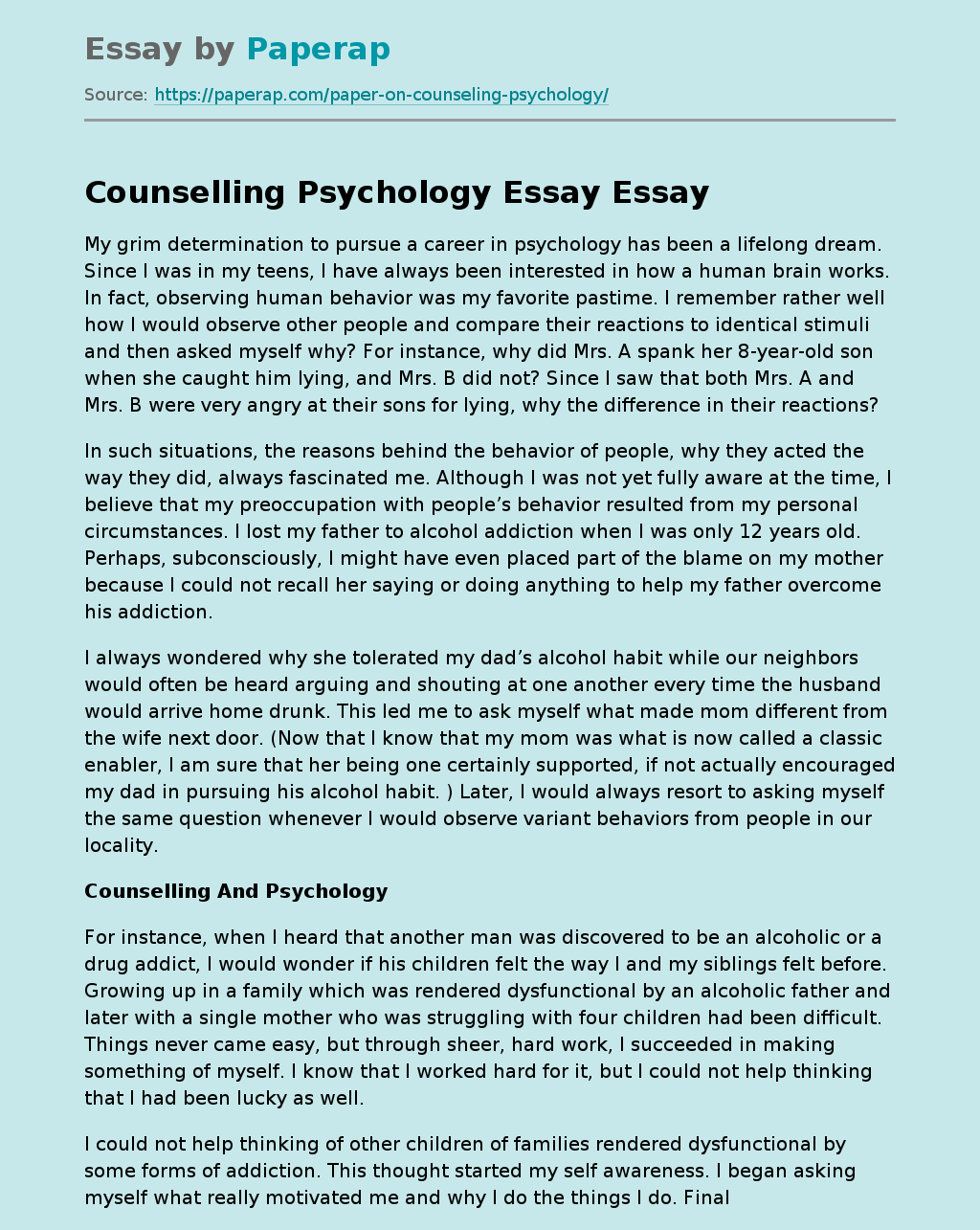Counselling Psychology Essay
My grim determination to pursue a career in psychology has been a lifelong dream. Since I was in my teens, I have always been interested in how a human brain works. In fact, observing human behavior was my favorite pastime. I remember rather well how I would observe other people and compare their reactions to identical stimuli and then asked myself why? For instance, why did Mrs. A spank her 8-year-old son when she caught him lying, and Mrs. B did not? Since I saw that both Mrs.
A and Mrs. B were very angry at their sons for lying, why the difference in their reactions?
In such situations, the reasons behind the behavior of people, why they acted the way they did, always fascinated me. Although I was not yet fully aware at the time, I believe that my preoccupation with people’s behavior resulted from my personal circumstances. I lost my father to alcohol addiction when I was only 12 years old.
Perhaps, subconsciously, I might have even placed part of the blame on my mother because I could not recall her saying or doing anything to help my father overcome his addiction.
I always wondered why she tolerated my dad’s alcohol habit while our neighbors would often be heard arguing and shouting at one another every time the husband would arrive home drunk. This led me to ask myself what made mom different from the wife next door. (Now that I know that my mom was what is now called a classic enabler, I am sure that her being one certainly supported, if not actually encouraged my dad in pursuing his alcohol habit.
) Later, I would always resort to asking myself the same question whenever I would observe variant behaviors from people in our locality.
Counselling And Psychology
For instance, when I heard that another man was discovered to be an alcoholic or a drug addict, I would wonder if his children felt the way I and my siblings felt before. Growing up in a family which was rendered dysfunctional by an alcoholic father and later with a single mother who was struggling with four children had been difficult. Things never came easy, but through sheer, hard work, I succeeded in making something of myself. I know that I worked hard for it, but I could not help thinking that I had been lucky as well.
I could not help thinking of other children of families rendered dysfunctional by some forms of addiction. This thought started my self awareness. I began asking myself what really motivated me and why I do the things I do. Finally, I realized that what I really wanted was to help troubled children coming out of dysfunctional families. I was convinced that children who experienced what I went through but who were not as lucky as I have been need all the help they can get. So I took every opportunity that would lead me to this path. I first worked as a case manager for a community health center.
Then I managed a youth home for troubled girls sentenced to the program through Youth Services. After that I worked with the prevention unit of another community health center. The financial demands of bringing up two sons, however, forced me to redirect my attention to my own family’s financial needs, so I started a retail business that would enable me to provide for my two sons adequately. However, after seven years, my lifelong passion resurfaced. I realized that I simply cannot turn my back on those people who need help and counseling.
I decided to go back to pursuing my passion by attending a counseling program to better equip me in my desire to help troubled people. But first, in 2006, I completed a certification program in hypnosis and acquired a credential for certified hypnotist because I am certain that the skill would prove helpful later. My ultimate objective is to acquire a master’s degree in psychology and have a career in counseling psychology. I am aware that a career in counseling psychology could be very physically exhausting, emotionally draining, and involves long hours of work.
However, these drawbacks are certainly offset by its most significant advantage: self-fulfillment. I know that helping people through counseling psychology will be the only career that would fulfill my lifelong dream. Besides, I get to be my own boss once I enter private practice. (Careers in Clinical and Counseling Psychology, n. d. ) Reference Careers in Clinical and Counseling Psychology. (n. d. ). Retrieved August 19, 2007, from http://www. wcupa. edu/_academics/sch_cas. psy/Career_Paths/Clinical/Career03. htm
Counselling Psychology Essay. (2019, Dec 05). Retrieved from https://paperap.com/paper-on-counseling-psychology/

